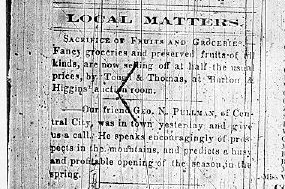

|
Pullman used the ranch as a stopover on
business trips between Central City and Denver, keeping a buggy
and horse team stationed there. He also used it to store
goods when his business at Central City ran out of space. However,
Pullman had a talent for turning a personal material necessity
into a money-making enterprise. The Cold Spring Ranch
became a prominent base camp for the gold fields, where patrons
could sleep inside the station house or camp on surrounding
acreage, sometimes for sizable amounts of time. The station
house likely served many uses, including sleeping quarters,
general store and saloon, perhaps more. The Cold Spring
Ranch became a central point for Pullman's freighting between
Central City and Denver, and he harvested hay on the ranch to
make more money. One of the most valuable and profitable
items of freight were hammer handles, which were greatly needed
by the miners in Central City. Pullman stayed in this
house many times, as the trip between Denver and Central City
was not short in the early 1860s. |
|
In time Pullman and his associates sold off the ranch after a successful five-year run. Although his tenure was brief, Pullman made the Cold Spring Ranch into the famous institution history records, encompassing an acreage bounded on the east by what is now Indiana Street, on the west by Ulysses Street, on the north by North Table Mountain and on the south by West 4th Avenue. After returning to Illinois Pullman became rich and internationally famous selling his railroad cars and his company was among the most prominent in American history. However, Pullman always continued to hold a fondness in his heart for the time he spent in Colorado, and he collected all the literature he could on Colorado of the early 1860s. Often he visited Colorado with his family, and on April 16, 1894 even brought Robert Todd Lincoln, the president's son, to Golden.
In 1868, William (Billy) Martin, who ran
the Railroad House hotel in downtown Golden near what would
be 11th and Ford streets, leased the property and continued
to run the Cold Spring Ranch as an important area institution.
He added an addition with a second story of several rooms to the
building, at which time it was also revealed part of it could
be used as a dance hall. This addition was to the side
and above the original building, requiring the dismantling of
its roof and chimney to do so. Martin also built a nearby
race track on South Golden Road where area residents raced horses.
Jonas Morris Johnson Sr., aka James, a prominent and prosperous Golden
citizen, was the man who purchased the Cold Spring Ranch from
the Pullman interests and continued its story of success from
there. Johnson was no stranger to running a lodging establishment,
having run the Rocky Mountain House hotel in Golden since 1859.
While at this ranch Johnson also served as Jefferson County Judge.
He also served as Jefferson County Sheriff, a post later occupied
by his son. |

|